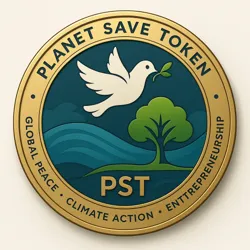Nearly 1.4 billion people around the world remain unbanked. Countless others face barriers like high transaction fees, lack of access to credit, currency instability, and delayed government aid. Traditional financial systems have failed to reach the people who need support the most — especially in regions battling poverty, displacement, and climate crises.
This is where decentralized financial solutions come in. Technologies like blockchain, when aligned with humanitarian values, offer new hope for inclusive, transparent, and direct financial systems.
🌍 What Traditional Finance Can’t Fix Alone
- 🌐 High Fees & Gatekeeping: Banks charge more the less you earn. Blockchain allows peer-to-peer transactions without middlemen.
- 🕰️ Slow Disbursement: Traditional aid often takes weeks. Crypto for humanitarian aid enables instant global transfers.
- 🚫 Lack of Trust: In areas plagued by corruption, on-chain finance ensures every coin is tracked, publicly.
Planet Save Token (PST) is at the forefront of this change. Built as a purpose-first token, PST provides a new foundation for governments, NGOs, and individuals to engage in financial inclusion through crypto.
🤝 Empowering People, Not Just Platforms
Through PST, a rural entrepreneur in South Asia can receive startup funding. A flood-affected family in Africa can be sent emergency funds. A youth-led NGO in Latin America can apply for and receive support — all transparently, with no need for banking infrastructure.
This is not just a better system. It’s a fairer one. Web3 for social good doesn’t require permission. It requires purpose — and that’s what PST delivers.
🌱 Planet Save Token exists to fill the gap between hope and action. Explore the future of financial equity at PlanetSaveToken.com — and help redefine how value flows in a borderless world.


